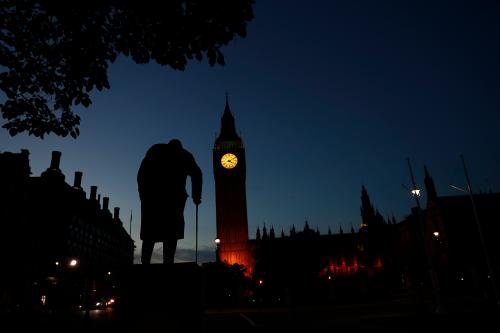At first glance, the findings of the most recent Pew Global survey seem paradoxical: although the developed countries are more satisfied with current economic circumstances than are developing nations, the latter are more optimistic about the future.
Among the citizens of developed countries, 51 percent assess their current economic circumstances as good, 45 percent as bad. For those in developing countries, the tally is 45 percent good, 54 percent bad.
But attitudes toward the future are dramatically different. In developing countries 56 percent of citizens believe that their children’s generation will be better off than their own, and only 38 percent anticipate a decline from their generation to the next. In developed nations these figures are turned on their head.

The loss of confidence in the future is a defining reality of life in advanced industrial societies. The U.S. is no exception—58 percent of Americans think their children’s generation will be worse off and only 37 percent have a more optimistic assessment. And the view from other English-speaking countries is even darker: only 24 percent of citizens from Canada and the UK expect economic progress from their generation to the next.

The gaps between assessments of the present and expectations for the future are startlingly large.
| Country | Current economic situation is good | Children will be better off financially | Difference |
|---|---|---|---|
| Netherlands | 87% | 35% | -52 |
| Germany | 86% | 36% | -50 |
| Sweden | 84% | 44% | -40 |
| Australia | 60% | 24% | -36 |
| Canada | 59% | 24% | -35 |
| UK | 51% | 24% | -27 |
| Senegal | 76% | 54% | -22 |
| Japan | 41% | 19% | -22 |
| U.S. | 58% | 37% | -21 |
| Philippines | 78% | 61% | -17 |
| Poland | 64% | 48% | -16 |
| Israel | 62% | 50% | -12 |
| France | 21% | 9% | -12 |
| Ghana | 46% | 63% | +17 |
| Greece | 2% | 21% | +19 |
| South Korea | 15% | 34% | +19 |
| Venezuela | 20% | 40% | +20 |
| Argentina | 23% | 45% | +22 |
| Chile | 45% | 69% | +24 |
| Nigeria | 41% | 72% | +31 |
| Brazil | 15% | 56% | +41 |
The Pew report offers no explanation for these attitudes. One clue may be found in the differences among generations: virtually without exception, young adults are more optimistic about their future than are their parents’ and grandparents’ generations. It is possible that older adults are integrating the economic disruptions they themselves have experienced into their expectations for the future that young adults face. It remains to be seen whether their pessimism would persist if the world economy shifts to and sustains a higher growth trajectory.
The Brookings Institution is committed to quality, independence, and impact.
We are supported by a diverse array of funders. In line with our values and policies, each Brookings publication represents the sole views of its author(s).







Commentary
Polling Spotlight: Prosperous countries have a paradoxically gloomy outlook
June 7, 2017